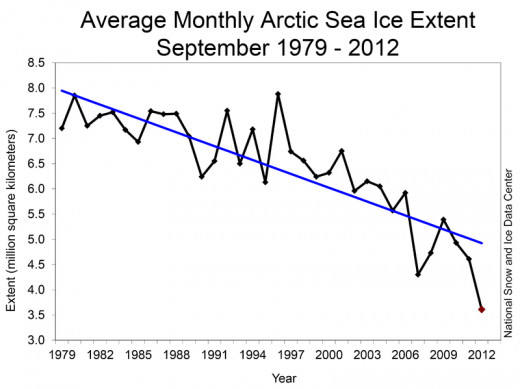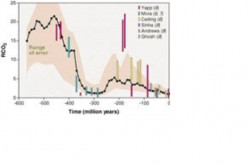The Reality of Climate Change
- mbuggiehposted 9 years ago
0

About 97% of all scientists accept a simple fact: Human activity on the planet Earth is contributing to global climate change. And as NOAA's National Climatic Data Center indicates: "It is worth noting that increasing global temperature is only one element of observed global climate change. Precipitation patterns are also changing; storms and other extremes are changing as well."
The proof and evidence of global climate change are everywhere, and yet, so are climate science deniers. What do you think drives anti-climate science politics in the United States?Actually, it's science. Most empirical climate scientists disagree with the UN's IPCC snow job.
Except...
Money is covertly supporting efforts to work to solve the climate change problem; investing in, for example, alternative energies, projects to leave earth, etc."And where do you get your data, Doc Snow? Al "Snake Oil" Gore?"
It's well-established science. This paper is a pretty good instance, though there are many other such studies.
http://link.springer.com/article/10.100 … 9-2#page-1
Hopefully that link will work for you.
Al Gore? A pretty good popularizer, and the National Academy of Science allowed that "An Inconvenient Truth" was by and large correct within the bounds of not over-complicating explanations.
But some of us can handle the straight stuff.
"We've been globally leveled off with a slight cooling trend for the last 17 years or so, according to empirical scientists. Could that be why the emphasis is off of "global warming" in recent years and more on "climate change?" But if we're cooling, why the persistent big push on reducing carbon footprints if carbon dioxide is only related to global warming?The cooling trend during recent millennia?"
The term "climate change" has been used longer than the term "global warming," but both are in common use now. But that's not terribly important.
To your main point: we *aren't* cooling. While the warming trend has not been statistically significant during the 'last 17 years or so,' it is not zero. the warmest year (NCDC) currently is 2010. And I don't know if you are keeping track or not, but the last three months of this year have been the warmest such period in the NCDC record (and GISTEMP, too, if I recall correctly.)
Big oil interests and stubborn anti-intellectualism are largely to blame. Sure, human contribution to global warming isn't as large as it's made out to be, but the fact remains that we are contributing, and global temperatures are getting higher and higher even if it doesn't directly affect you.
Big oil companies are, of course, against the notion because it means that a new power source would have to either replace oil or complement it, and either way, they'll lose money. Despite the fact they could build a continent out of their cash, losing any amount of money is a nightmarish proposition, and they can't have that, now, can they? And so they put out the ads backed by dubious research to claim there is no issue, because foresight is not something they possess.
And then the dumb people are just dumb. Big company said it, so it must be true. No need to look into it."...human contribution to global warming isn't as large as it's made out to be…"
Where do you get that idea? The natural direction at this point would likely be *cooling*--the height of the interglacial period came 8-10 thousand years ago, and the long-term trend had been a cooling one, till the Industrial Revolution came along. Now we're probably pretty close to where we were during the so-called "Holocene Optimum."
And getting warmer.And where do you get your data, Doc Snow? Al "Snake Oil" Gore?
We've been globally leveled off with a slight cooling trend for the last 17 years or so, according to empirical scientists. Could that be why the emphasis is off of "global warming" in recent years and more on "climate change?" But if we're cooling, why the persistent big push on reducing carbon footprints if carbon dioxide is only related to global warming?
Wake up.
https://youtube.com/watch?v=YtevF4B4RtQSo...the 97% of professional scientists with credible reputations who are demonstrating even as I type these words that global climate change IS real and IS a function of human activity (at least in part) are all wrong or [according to you and your YouTube video source] dupes?
Big oil? Just look at the BIGGEST OIL people at the Rockefeller Foundation's website. They are all warm and fuzzy about this climate change scam.
They are playing our egos like a symphony.I lean toward the growing and profound anti-intellectualism/anti-science mindset of many in the American public and its exploitation by self-interested politicians.
And yes, "dumb people are just dumb" and science is hard.
At the end of the day, learning science is hard, the truth is hard, and so it is easier---at least for some, to just remain "dumb".
mbuggieh, interesting topic, but there are lots of lies and half-truths being bandied about. Take your graph, for instance. Nothing on it says if it's for both poles or for only the north polar region. From all I've heard, Antarctica sea ice has been increasing in recent years, making the average net increase planet-wide about zero.
Take for instance the "97% of all scientists" crap. Who did this survey? The UN? The United Nation's Intergovernmental Panel on Climate Change has lied more times than you can shake a stick. They've had numerous empirical climate scientists quit in protest over the UN's lies only to have those scientists find their own names still attached to those lies. One scientist took the UN to court to get his name removed. So, does the 97% include those scientists who disagree and find their names held hostage? Seems so!
By one study, most empirical scientists disagree with this global warming, climate change junk. Most computer climate modelers are on the agree side of things. Climate modeling is highly inaccurate after a few weeks. You cannot predict long range effects -- ever! Read "Chaos: The Making of a New Science," by James Gleick.
The UN has already been caught with their pants down over Climate Gate -- FUDGING NUMBERS is Scientific FRAUD! Pay attention to that simple little fact. Some people are making $Trillion$ off of this fraud. It also gives them political leverage and that spells "power."
Selling "carbon tax" is a lucrative business. Many an unethical scientist are cashing in on this cash cow.
Climate change has been occurring for the last 4.5 BILLION years -- ever since the first few wisps of volatiles ever hit Earth. Show me anyone who denies climate change. Anthropogenic climate change is a different matter. And there's too much political wrangling to get straight answers, except from unbiased sources -- and there aren't many of them left.
Global warming is the lie they tried to sell, using it as the reason for controlling our carbon footprints. But carbon dioxide has nothing to do with causing global warming! Period! Now that the global climate has been on a slight cooling trend for the last 17 years, "global warming" has been shifted to "climate change," but the erroneous "carbon footprint" scam is still ever present. How curious. If we're cooling, what has carbon dioxide got to do with it? Why are they still pushing carbon taxes?
When CO2 got its biggest boost in the build-up for WW2 up until the mid-70s, worldwide climate cooled steadily. CO2 jumping up, but the world was cooling for 35 years! Politicians were getting frantic that Global COOLING was going to ruin us all.
The UN has been spreading lies. And more and more people have been swallowing those lies.
The anti-climate change science doesn't exist. Anti-UN climate scam exists in abundance, but the same people who are promoting the scam own the newspapers, TV stations and other news media.
Here are some scientists who have hard facts against this climate change scam:
https://youtube.com/watch?v=YtevF4B4RtQWhere are you getting this utterly bogus information?
But it's true, Lonestar. One campfire, one home furnace, one power plant (whether solar, fossil fuel, nuclear or tidal) and mankind has contributed to global warming. Of course, so does a gazelle, running across the plains...
I think, wilderness, the aggregation of effect is lost on many people---particularly those who have been indoctrinated into hate for the United Nations and for anything even remotely intellectual or scientific or reconstituted [somehow] as a threat to their Creationist mythologies
Lost? Not likely - what seems lost is the ability (or willingness) to understand that large numbers of people are not likely to equate with the forces of nature in effect. Lots of people just does NOT equal global warming, no matter how many there are or how loud we shout that people are to blame. Outside of falsified, and/or conveniently ignored, data there is just no reason to think that we've the ability to change the course of nature.
"...large numbers of people are not likely to equate with the forces of nature in effect."
Probabilistic statements are useful where we lack detailed physical understanding. That is not the case here.
"Outside of falsified, and/or conveniently ignored, data there is just no reason to think that we've the ability to change the course of nature."
Incorrect. The data are incontrovertible that atmospheric carbon dioxide levels have increased roughly 40% since the beginning of the Industrial Revolution.
That we are responsible is also incontrovertible. We know it through 3 ones of evidence: first, simple accounting for fuel burnt; second, through isotopic study of the composition of the carbon, and third, through a small but tell-tale decrease in oxygen concentrations (since the carbon dioxide is a combustion product, primarily.)
And that in itself is a significant change to what you term the 'course of nature.' (A curious phrase to my mind, since all the processes that are involved, from the human drive to increase our comfort and security to the combustion process itself are all entirely 'natural.') But the consequences don't stop with that change, of course: as we've known since the work of John Tyndall and Svante Arrhenius (1860 and 1896; see my Hubs on them if you'd like more detail) that the inevitable consequence of this would be planetary warming.
Some imagine that this is just hubris, that 'puny humans' can't possibly affect such grand systems. They deny the possibility on this ground, and profess appropriate humility. However, they are mistaken in this: we aren't the first species to alter Earth's atmosphere in a cataclysmic way. The cyanobacteria did just that about two billion years ago when they evolved photosynthesis. Uncontrolled and unbalanced, the result was an oxygen-rich atmosphere that killed off most living things of that day, including most cyanobacteria. (Though some descendants persist to this day in many environments.)
There's no reason to think that they were capable of worrying about pride or humility, or indeed much of anything else. They just did what they did. I'd like to think that our persistent worrying actually has some value, and that reflecting on reality and on our own behavior can lead us beyond simply 'doing what we do.' If not, then our future will not be healthy or prosperous.
So--not arrogance. Responsibility.Sorry, but probability figures, with made up numbers because we don't have real data, just isn't enough to radically change our lifestyle.
CO2 has indeed changed. Due to less vegetation? Volcanoes? Fossil fuels? Increased animal life (thinking herds of food animals)? That isotope studies indicate some is from burning fossil fuels is insufficient reason to radically change our lifestyle. Nor do I believe that CO2 levels have gone up 40%; it is closer to 30% and they have gone from as high as 20% to the current .04% over geological ages. (http://earthguide.ucsd.edu/virtualmuseu … 07_1.shtml)
(http://earthguide.ucsd.edu/virtualmuseu … 07_1.shtml)
Claiming that all fuels burned end up as CO2 for indefinite periods is false; much of it is returned in the form of carbonic acid in acid rain and absorbed into rock during tectonic activity. An "automatic" correction by nature. Nor does a small decrease in O2 concentrations come from burning fuels; far more likely is decreased vegetation levels and ozone depletion. Don't forget that burning fuels requires O2; if we are producing CO2 at the rate you claim then O2 should decrease at about the same level.
Bottom line: yes, we contribute. How much is questionable, as is the result of what we do in terms of global warming. So is the good/bad result in terms of human life - will we fare better at an elevated temperature or worse? So, yes, pay attention and make some plans but don't try to starve out most of the human population in changes from scare tactics that we cannot know are true or not."Sorry, but probability figures, with made up numbers because we don't have real data, just isn't enough to radically change our lifestyle."
We have reams of data. See for instance the five IPCC Assessment Reports, or the US national assessment which came out earlier this year.
"That isotope studies indicate some is from burning fossil fuels is insufficient reason to radically change our lifestyle."
No. The studies indicate that the net increase is entirely due to fossil fuel burning.
Of course this fact by itself is not enough to yada, yada. But it's sure good reason to believe we have, as I said 'changed the course of nature.'
"Nor do I believe that CO2 levels have gone up 40%; it is closer to 30% and they have gone from as high as 20% to the current .04% over geological ages."
No offense, but your belief isn't particularly relevant here. The fact is that the pre-Industrial value was about 280 ppm, and the current value is about 400 ppm. Do the math; you'll find that the increase is close to 43%.
"Claiming that all fuels burned end up as CO2 for indefinite periods is false; much of it is returned in the form of carbonic acid in acid rain and absorbed into rock during tectonic activity."
Yes--over timespans of millennia. That's not relevant to the next couple of centuries.
"Nor does a small decrease in O2 concentrations come from burning fuels; far more likely is decreased vegetation levels and ozone depletion. Don't forget that burning fuels requires O2; if we are producing CO2 at the rate you claim then O2 should decrease at about the same level."
No. CO2 is, as I said, at 400 PPM. O2 is at roughly 209,460 ppm. The math has been done on this question, too. See, for instance, this example from Ralph Keeling, dealing with one part of the problem:
http://bluemoon.ucsd.edu/publications/r … balCO2.pdf
"Bottom line: yes, we contribute. How much is questionable, as is the result of what we do in terms of global warming."
Yes, precisely how much is in question, though quite clearly it is a substantial proportion. (And it may be greater than 100% of observed, since, as noted, there could well be a 'natural' cooling trend going on underneath the anthropogenic warming.)
So--how lucky do you feel?
"So is the good/bad result in terms of human life - will we fare better at an elevated temperature or worse?"
Short answer: worse. There is rather a lot of analysis on this. Overwhelmingly, the greater we allow the warming to be, the worse for us (and much of the rest of the biosphere.) See the second volume of AR5, the portion dealing with impacts.
"So, yes, pay attention and make some plans but don't try to starve out most of the human population in changes from scare tactics that we cannot know are true or not."
Well, I'm not reacting to 'scare tactics'; I'm reacting to sober analysis. And what that analysis suggests, very strongly, is that by far the biggest starvation threat is coming from climate change. We can't know much for sure about tomorrow. But we can go with the best information that we do have. Essentially, all I'm saying is that we should do just that, and not let the existence of some uncertainty blind us to the helpful information that we do possess.Something I have learned in dealing with science deniers:
Don't cloud the issue with facts.
Facts and numbers don't matter. Agendas (political and religious) matter.
They will NEVER accept any facts or any scientific analysis. Never.
They are driven by agendas which I will never (thankfully) comprehend. Sadly, their agendas have the power to destroy the planet on which we all live.
Climate science deniers are no different than the anti-vaccine crowd: Uninformed; driven by Evangelical Christianity; motivated by reactionary politics; dazzled by celebrity endorsements of mysticism and spiritualism; self-described fanatics and zealots; strident "believers" in whatever pacifiers they are sold.Very often true. But that doesn't mean that it's a good idea to let their erroneous ideas pass unchallenged.
And every one is, after all, an opportunity to educate someone else--someone with an open mind who just happens to come along after the fact.
True, time and energy can limit this--commenting online is not life, after all, just a small part of it. It does need to be kept in some kind of proportion. (Cf., "Someone is wrong on the Internet!")
"No. The studies indicate that the net increase is entirely due to fossil fuel burning."
Not a single volcano spewing CO2 and sulfides into the atmosphere since the industrial revolution. Wonder what the flack was about Mt. St. Helens, then. Don't be ridiculous; of course there are natural sources of CO2 and of course it is still being produced without man.
The figures I saw were 300 and 395 ppm. That's just under a 33% increase - just maybe that's part of the problem - no two studies can ever agree on something that is, after all, easily measured.
"Yes--over timespans of millennia. That's not relevant to the next couple of centuries."
Then I'm a really old man, because acid rain has been for some time and is continuing to damage the NE. Acid rain from the power plants there, no less.
"No. CO2 is, as I said, at 400 PPM. O2 is at roughly 209,460 ppm. The math has been done on this question, too. "
What little I got from the link (didn't study it all) indicates almost no O2 depletion. Yet CO2 requires O2 to form; where is the oxygen coming from? Guarantee that if you shut off the air from the power plants you won't be burning anything - that would seem to mean it's coming from the atmosphere. So what is replenishing very nearly as fast as it is used to make CO2?
"So--how lucky do you feel?"
Lucky enough not to trade my cars for bicycles or stop heating my home in the winter. Lucky enough not to take all the diesel fuel from farmers and truckers supplying my food supply. Lucky enough to keep the water and sewer plants powered. In practice my home and Prius are leaving a far smaller carbon footprint than the average person: I don't find the necessity to reduce it any further because of bloated, falsified studies that so conveniently leave out half the information needed to make a truly informed decision."Not a single volcano spewing CO2 and sulfides into the atmosphere since the industrial revolution."
I didn't say that there were no natural carbon fluxes; I said that the net difference was demonstrably due to human emissions. The natural fluxes are much bigger than human ones; but they are both uncontrollable and (on average) in balance over time. Human emissions are like that last, unadvisable debt taken on, which, though small in comparison with the total budget, create an enormous cumulative burden over time.
"The figures I saw were 300 and 395 ppm."
The former is a bit vaguer than the latter; measurement was quite difficult for much of the 19th century, and the question also depends upon just *when* you define the beginning of the Industrial Revolution to have occurred. Nevertheless, 280 is a better number than 300; CO2 was only at 316 in 1958, at the beginning of the Mauna Loa record:
http://co2now.org
http://cdiac.ornl.gov/ftp/trends/co2/si … aloa_c.dat
Guy Callender--I have a Hub about him, too--arrived at a best estimate of background level as 280 back in 1936 when he first published, and that number has held up since.
The current number is well measured, and for June 2014, the average value was 401.3. If you prefer, you are certainly welcome to take the 300 ppm as your personal baseline, in which case it's a 34% increase. Does it really matter? We've made a very significant change here.
"...because acid rain has been for some time and is continuing to damage the NE."
Sure, weathering of rock goes on all the time. But the sequestration times are as I have stated:
http://press.princeton.edu/titles/8719.html
Dr. Archer is the recognized authority on this. He's a tenured professor at the University of Chicago, where he teaches climate science. The blurb is a bit vague, but again, I have a Hub on the book where you can find the details as to just why "Carbon dioxide emitted today will be a problem for millennia."
"What little I got from the link (didn't study it all) indicates almost no O2 depletion…"
They did a quantitative analysis. Argue with them, not me--though I'd suggest you study the paper thoroughly first. And don't forget, this was a 1996 paper. You might want to study more recent work on the topic if you're going to argue with the scientists. (Afraid I'm guilty of basically picking a random paper out of many, many available on the topic.)
"In practice my home and Prius are leaving a far smaller carbon footprint than the average person…"
Congratulations on taking a wise precaution.
"I don't find the necessity to reduce it any further because of bloated, falsified studies that so conveniently leave out half the information needed to make a truly informed decision."
I suggest that you read the actual science. If you do--and I'm not suggesting it's easy, trust me!--you won't find that they 'conveniently leave out half the information needed.' If you want an overview (and actual papers tend to be overwhelming for most of us non-scientists), then I'd suggest the reports I mentioned above. They paint a pretty compelling picture, and it's backed up to the nth degree with cutting edge research. Still not easy reading, but easier than the alternative route.
And please note that no-one is asking you to stop heating your home, or any of those other straw men you threw up. Of course we use fossil fuels for things we need. That's why we need to work to achieve a sustainable energy economy; if it happened magically, without cost or effort, no-one would be worried about achieving it. In the real world, of course, it takes thought, work, skill, money and time--with the last being in the shortest supply. Though perhaps I should have included 'will', in which case that would've been in shorter supply yet, as your comment illustrates.
James Gleick is a science writer known for popularizing the so-called "Butterfly Effect". And, the book you reference, "Chaos: Making a New Science" (1989), is an explanation of chaos theory intended for popular audiences and NOT a critique of the methodologies or claims of contemporary climate science. Gleick does NOT make the assertions you claim about climate science or climate change.
The assertions you wrongly ascribe to Gleick (and you really should read his book) are found on a variety of webpages and blogs that pervert chaos theory as part of some larger project to discredit climate science by claiming that since the universe is "chaotic" any mathematically-derived patterns must be meaningless and wrong.
Understanding even the basics of chaos theory allows one to understand that the theory supports the notion that even the smallest action can have a tremendous effect. In other words: A butterfly flapping its wings in Australia effects the entire trajectory of the universe. Every action---no matter how small, has a profound effect.
Understanding the rudiments of chaos theory allows one to understand, for example, that the burning of fossil fuels (a human activity) as a profound effect on the universe.
Now, here's a bombshell for you:
Global warming is good!
How?
You know what happens when you boil water, right? Steam comes off. Liquid water becomes water vapor. But how much steam comes off of ice water? None! There's almost no evaporation.
When there's little or no evaporation, you get far fewer clouds. With fewer clouds, you get less rain. With less rain, you get fewer plants growing. With fewer plants, you get fewer animals. In other words, global cooling means more death, more deserts, more dust.
Global warming means more clouds, more rain, more forests, more life!
So what if people have been foolish enough to build next to the ocean? Let them build dikes around their endangered cities or move! The way the global climate has been going up and down steadily, though, such a threat will be very slow in coming. We can prepare for such a thing over many centuries. In other words, no need to pay $Trillion$ in this bogus "carbon tax." And if you read my earlier comment, you see that carbon dioxide has nothing to do with global warming.Your claim that "global warming is good" is an attempt at humor...right?
..what is good is that the earth is flat and the center of the universe to boot! What we are witnessing is the mindset of tradition = good, change = bad and there is no in-between and so let's keep thinking in black and white, OK? Simple minds embrace simple answers and rejecting climate change is the easiest way out. And it also just happens to be good for the bottom line (in the short term)!
Related Discussions
- 136
Do You Believe Humans Caused the Climate Change?
by emievil 14 years ago
I came upon this news that a study showed majority of the Americans do not believe humans caused global warming / climate change. Any idea if this is true? What about the rest of the world, what do we believe?This is the website - http://www.guardian.co.uk/environment/2 … -activity.
- 13
Have you, like most Americans, finally given up on the Global Climate Change sca
by Ralph Schwartz 7 years ago
Have you, like most Americans, finally given up on the Global Climate Change scam?Nearly three-quarters of Americans don’t trust that there is a large “scientific consensus” amongst climate scientists on human behavior being the cause of climate change, according to an in-depth survey on “the...
- 38
Why do you not believe in Global Warming/Climate Change?
by Randy Godwin 6 years ago
Why do you not believe in Global Warming/Climate Change?I have no doubt our earth is warming at an alarming rate. One of the reasons I think this is because of the photo I included with the question. Otzi--the Iceman--was frozen over 5000 years ago and has remained that way through all sorts of...
- 129
49% of American believe climate change is a hoax or "aren't sure"
by Sychophantastic 9 years ago
These are results of a public policy poll:Q1 Do you believe global warming is a hoax, ornot?Do ................................................................... 37%Do not ............................................................. 51%Not sure...
- 24
CLIMATE CHANGE IS REAL---EVEN IF YOU ARE A SELF-DEFINED "CONSERVATIVE"
by mbuggieh 10 years ago
REAL CLEAR SCIENCE reports:"Not a single reputable scientific body rejects the idea that climate change is man-made. Drilling that fact home is a recent survey of over 12,000 peer-reviewed climate science papers, of which over 97% endorsed the idea that climate change is caused by man. And...
- 42
Global Warming and its effects.
by Mike Russo 10 years ago
Do you believe global warming is causing the extreme weather conditions we are experiencing in the U.S? Please watch this video and then comment.http://www.youtube.com/watch?v=u7EHvfaY8Zs











